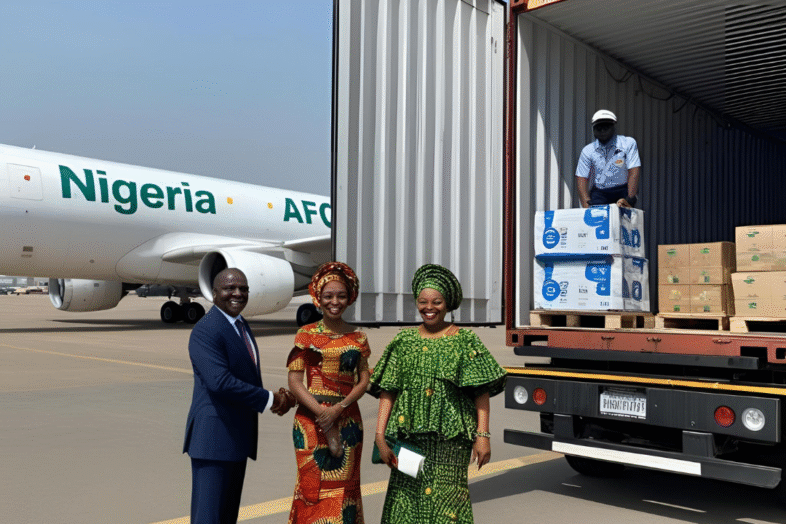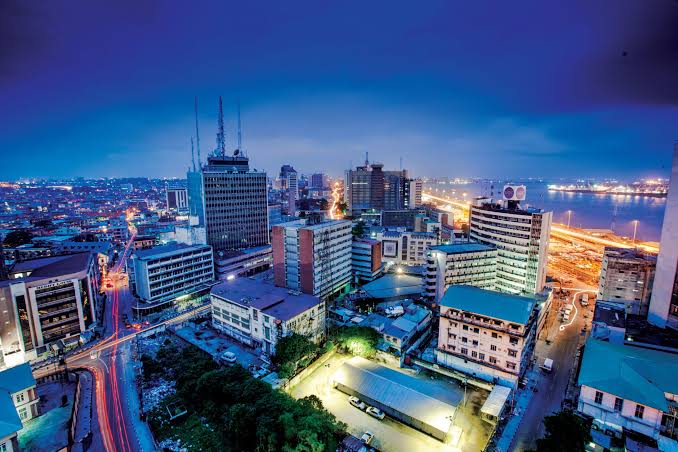
- May 26, 2025
- 170
- Business
Abuja, Nigeria – The Federal Ministry of Industry, Trade and Investment, in a pivotal collaboration with the United Nations Development Programme (UNDP) and Uganda Airlines, has officially inaugurated the Nigeria–East/Southern Africa Air Cargo Corridor. This transformative export initiative, operating under the umbrella of the African Continental Free Trade Area (AfCFTA) framework, is set to revolutionize intra-African trade for Nigerian businesses.
The inaugural cargo shipment, launched on Africa Day from the Nnamdi Azikiwe International Airport, Abuja, showcased a diverse array of “Made-in-Nigeria” products, including textiles, cosmetics, fashion accessories, and agro-processed goods. Significantly, all exporters on this historic flight were women, recognized as pioneers leading the charge in positioning Nigerian enterprises at the forefront of intra-African trade.
Speaking at the landmark event, the Honourable Minister of Industry, Trade and Investment, Ms. Oduwole, announced that the new air corridor will provide Nigerian exporters with unprecedented access to three key African hubs: Uganda, Kenya, and South Africa. A cornerstone of this initiative is a substantial reduction in logistics costs, with air cargo rates discounted between 50% and 75%, including regulatory charges.
This initiative marks the fulfillment of a key campaign promise by President Bola Ahmed Tinubu, GCFR – to accelerate the diversification of Nigeria’s non-oil exports by leveraging the immense opportunities presented by the AfCFTA. The Federal Government reaffirms its commitment to supporting Nigerian businesses in scaling their exports across the continent.
Specifically designed to empower Nigerian enterprises, particularly Micro, Small, and Medium Enterprises (MSMEs), this initiative enables them to expand into African markets with greater confidence, lower costs, faster delivery timelines, and reduced risk. The preferential cargo rates will apply to businesses affiliated with leading national business associations, including the Nigerian Association of Chambers of Commerce, Industry, Mines, and Agriculture (NACCIMA), the National Association of Small and Medium Enterprises (NASME), the National Association of Small Scale Industrialists (NASSI), and the Women’s Chamber of Commerce, Industry, Mines, and Agriculture (WCCIMA), ensuring inclusive participation and coordinated implementation.
This milestone follows President Bola Ahmed Tinubu, GCFR’s approval and the formal gazetting of Nigeria’s Provisional Schedule of Tariff Concessions (PSTCs) in April 2025. With robust support from the UNDP Regional Bureau for Africa, the Ministry has strategically worked to position Nigeria not merely as a participant in AfCFTA but as a leader in shaping and advancing the agreement’s implementation.
Operating from both Lagos and Abuja, the corridor is bolstered by strong government collaboration. In her remarks, Ms. Oduwole expressed profound appreciation to the Minister of Finance and the Coordinating Minister of the Economy, the Minister of Aviation, as well as the Comptroller General of the Nigeria Customs Service, and the Managing Director/Chief Executive Officer of the Federal Airports Authority of Nigeria, for their instrumental roles in facilitating the successful launch.
“AfCFTA tariffs are now gazetted, allowing Nigerian goods to benefit from lower tariffs across African markets,” Ms. Oduwole stated. “As we mark Africa Day, I want to especially commend and thank the indefatigable Nigerian businesses that are sending shipments on this inaugural flight. Today, they export a diverse product basket – textiles, bags, cosmetics, agro-processed products and more to our African partners. This Administration will continue to stand with you as you take bigger and bolder leaps to expand your footprint across Africa.”
This new air cargo corridor represents a significant stride in Nigeria’s economic diversification efforts and a concrete demonstration of its commitment to realizing the full potential of the AfCFTA for the benefit of Nigerian businesses and the broader African continent.









Add Comment